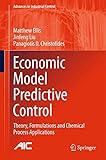Economic Model Predictive Control [electronic resource] : Theory, Formulations and Chemical Process Applications / by Matthew Ellis, Jinfeng Liu, Panagiotis D. Christofides.
By: Ellis, Matthew [author.] .
.
Contributor(s): Liu, Jinfeng [author.] | Christofides, Panagiotis D [author.]
| Christofides, Panagiotis D [author.] | SpringerLink (Online service)
| SpringerLink (Online service) .
.
Material type:  BookSeries: Advances in Industrial Control: Publisher: Cham : Springer International Publishing : Imprint: Springer, 2017Edition: 1st ed. 2017.Description: XXIV, 292 p. 95 illus., 16 illus. in color. online resource.Content type: text Media type: computer Carrier type: online resourceISBN: 9783319411088.Subject(s): Control engineering
BookSeries: Advances in Industrial Control: Publisher: Cham : Springer International Publishing : Imprint: Springer, 2017Edition: 1st ed. 2017.Description: XXIV, 292 p. 95 illus., 16 illus. in color. online resource.Content type: text Media type: computer Carrier type: online resourceISBN: 9783319411088.Subject(s): Control engineeringIntroduction -- Background on Nonlinear Systems, Control, and Optimization -- Brief Overview of EMPC Methods and some Preliminary Results -- Lyapunov-Based EMPC -- State Estimation and EMPC -- Two-Layer EMPC Systems -- EMPC Systems: Computational Efficiency and Real-Time Implementation.
This book presents general methods for the design of economic model predictive control (EMPC) systems for broad classes of nonlinear systems that address key theoretical and practical considerations including recursive feasibility, closed-loop stability, closed-loop performance, and computational efficiency. Specifically, the book proposes: Lyapunov-based EMPC methods for nonlinear systems; two-tier EMPC architectures that are highly computationally efficient; and EMPC schemes handling explicitly uncertainty, time-varying cost functions, time-delays and multiple-time-scale dynamics. The proposed methods employ a variety of tools ranging from nonlinear systems analysis, through Lyapunov-based control techniques to nonlinear dynamic optimization. The applicability and performance of the proposed methods are demonstrated through a number of chemical process examples. The book presents state-of-the-art methods for the design of economic model predictive control systems for chemical processes. In addition to being mathematically rigorous, these methods accommodate key practical issues, for example, direct optimization of process economics, time-varying economic cost functions and computational efficiency. Numerous comments and remarks providing fundamental understanding of the merging of process economics and feedback control into a single framework are included. A control engineer can easily tailor the many detailed examples of industrial relevance given within the text to a specific application. The authors present a rich collection of new research topics and references to significant recent work makingEconomic Model Predictive Control an important source of information and inspiration for academics and graduate students researching the area and for process engineers interested in applying its ideas.


There are no comments for this item.